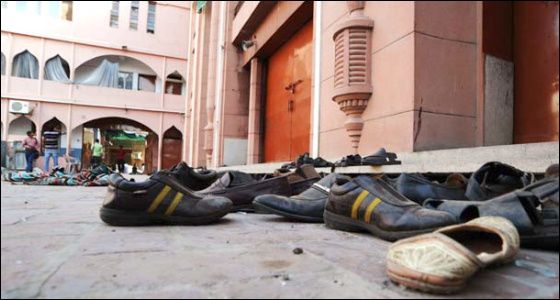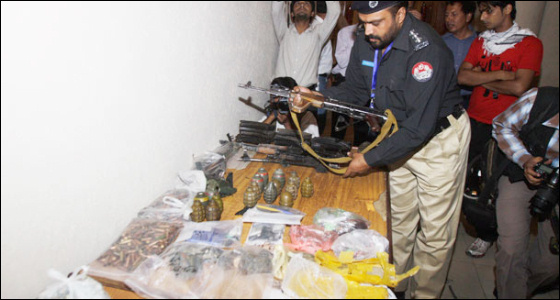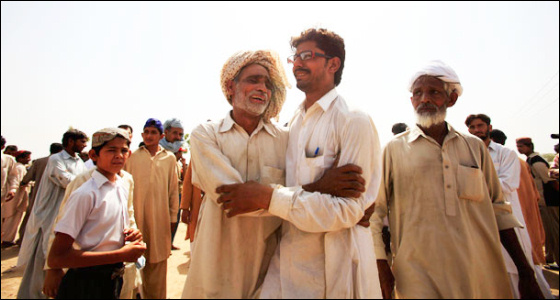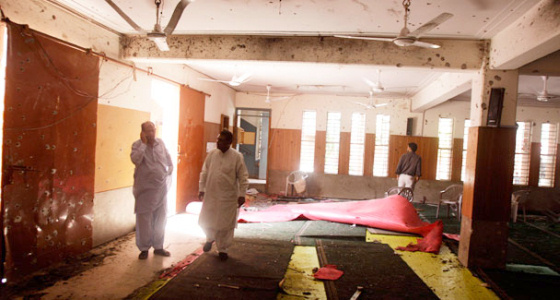---Daily Times, Pakistan
Monday, May 31, 2010
VIEW: The Second Amendment — Yasser Latif Hamdani
The Second Amendment laid the foundations of intolerance and religious tyranny in Pakistan, which has manifested itself in other ways. Since then our state has been in a downward spiral
The violence against the Ahmediyya community underscores the bigotry that has become the hallmark of our beloved homeland. A community — already sacrificed at the altar of political expediency — has now been made to pay the ultimate price.
Amongst the dead, which included retired army officers and other contributors to Pakistani society, was reportedly the youngest brother of Chaudhry Zafarullah Khan. For those who are unaware of who Chaudhry Zafarullah was, he was the author of the Lahore Resolution, Pakistan’s first foreign minister and Pakistan’s advocate before the Boundary Commission. In other words, this community has paid for such crimes as their valiant contribution to the Pakistan Movement, their significant role in the development of Pakistan and the fact that Pakistan’s only Nobel Prize was bagged by them. Yet what happened on Friday was waiting to happen, given the neglect and at times outright bigotry that our governments, both federal and provincial, have been guilty of on this count starting with the PPP government in 1974.
Things were not always like this. It bears remembering that in 1944 when a group of Muslim divines approached Jinnah to persuade him unsuccessfully to turn all Ahmedis out of the Muslim League, Jinnah was resolute against such bigotry. He responded to them by saying, “Who am I to declare non-Muslim a person who calls himself a Muslim?” It was for this reason that many religious parties and even self-styled freedom fighters like Mirza Ali Khan (Faqir of Ipi) denounced the Muslim League as a “bastion of Qadiyanism”. Yet such was the force of character of our founding father that he not only stood against such bigotry but without any fear appointed the leading Ahmedi Muslim at the time to shoulder the most important responsibility for the Muslims of South Asia, i.e. of arguing Pakistan’s case before the Boundary Commission. So long as the Quaid’s colleagues were at the helm, there was some semblance of common sense that prevailed on this issue. When in 1953, the Majlis-e-Ahrar and the Jamaat-e-Islami, both groups that had opposed the creation of Pakistan, started a mass agitation movement to have Ahmedis like Chaudhry Zafarullah turned out from the government and excommunicated from Islam, Khawaja Nazimuddin, himself a devout Muslim, refused to bow under their pressure. His government fell a few weeks later and the establishment stepped in to sweep up the mullahs with extreme prejudice.
In 1974, Zulfikar Ali Bhutto was determined to hang on to power by hook or by crook. Though not a bigot himself, Bhutto was ill-advised by his law minister Abdul Hafeez Pirzada. As a result, the PPP stabbed in the back the one community that had helped them in winning the 1970 elections, by putting a question to parliament that it had no authority to determine. As a result Bhutto managed to hang on to power for another three years. The usurper who replaced Bhutto, General Ziaul Haq, took bigotry against the Ahmedis to another level altogether with his unconstitutional and inhumane Ordinance XX of 1984 specifically targeting this community. His bigotry was upheld by our independent judiciary in Zaheeruddin v The State, where the dispensers of justice compared Islamic symbols with Coca Cola’s intellectual property in an argument that defies all legal sense and logic to justify the ban on the Ahmedis from using any Islamic symbols — symbols that are central to their faith.
Martin Lau, a leading legal scholar of religious freedom in common law jurisdictions, has argued in his paper on Zaheeruddin v The State that Pakistan has abolished religious freedom for Pakistanis, Muslims and non-Muslims alike, through this judicial precedent. My own view is that the very idea of Pakistan as a bastion against the tyranny of the majority was killed the day our parliament decided to take it upon itself to excommunicate a sect from Islam. The Second Amendment laid the foundations of intolerance and religious tyranny in Pakistan, which has manifested itself in other ways. Since then our state has been in a downward spiral. The Gojra incident, violence against Shias, and now the massacre of the Ahmedis is only symptomatic of the real sickness that emerges from the 1974 Amendment. Pakistan shall continue to be on the wrong side of history as long as the Second Amendment remains in the constitution of this republic.
The time has come for the PPP government to undo this great injustice done to not just a minority sect but to Pakistan itself. All roots of Pakistan’s current existential crisis with Islam emerge from that one foul act that was brought about on the ill-advice of Abdul Hafeez Pirzada, who is now challenging parliament’s sovereignty, the same sovereignty he had argued 36 years ago as being absolute. It is now up to the PPP to make a clear choice. Will it continue to defend a dubious legacy or will it come out decisively against religious bigotry?
History beckons President Zardari and Prime Minister Gilani to clear the name of Pakistan’s largest political party by undoing what it did in 1974. In this they must be supported unwaveringly by the MQM and the ANP — for they claim to be the guardians of secular liberal politics. The Sharif brothers must also atone for their sins — of having spoken from both sides of their mouths — by supporting this move. Even the religious parties, the Jamaat-e-Islami foremost amongst them, must state unwaveringly that while they may not consider the Ahmedis Muslims, they are willing to leave this final judgement to God.
If they manage to undo this grievous injustice and act of inhumanity, the ladies and gentlemen in our parliament will secure for themselves a permanent place in Pakistan’s history as the visionaries who restored Jinnah’s Pakistan, which is to be built on the ideals of justice, fair play, impartiality and complete equality for all citizens of Pakistan.
Yasser Latif Hamdani is a lawyer based in Islamabad. He can be reached at yasser.hamdani@gmail.com
URL: www.dailytimes.com.pk/default.asp?page=2010\05\31\story_31-5-2010_pg3_5











